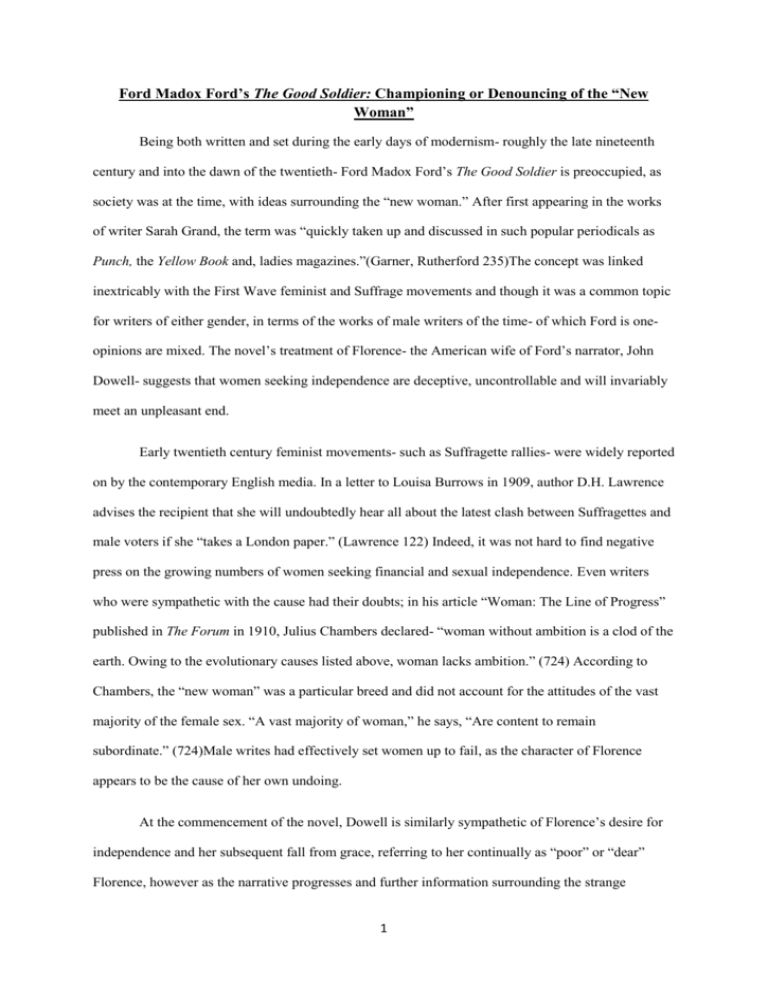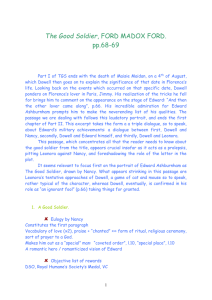Formative Assignment (Ford and The New Woman)
advertisement

Ford Madox Ford’s The Good Soldier: Championing or Denouncing of the “New Woman” Being both written and set during the early days of modernism- roughly the late nineteenth century and into the dawn of the twentieth- Ford Madox Ford’s The Good Soldier is preoccupied, as society was at the time, with ideas surrounding the “new woman.” After first appearing in the works of writer Sarah Grand, the term was “quickly taken up and discussed in such popular periodicals as Punch, the Yellow Book and, ladies magazines.”(Garner, Rutherford 235)The concept was linked inextricably with the First Wave feminist and Suffrage movements and though it was a common topic for writers of either gender, in terms of the works of male writers of the time- of which Ford is oneopinions are mixed. The novel’s treatment of Florence- the American wife of Ford’s narrator, John Dowell- suggests that women seeking independence are deceptive, uncontrollable and will invariably meet an unpleasant end. Early twentieth century feminist movements- such as Suffragette rallies- were widely reported on by the contemporary English media. In a letter to Louisa Burrows in 1909, author D.H. Lawrence advises the recipient that she will undoubtedly hear all about the latest clash between Suffragettes and male voters if she “takes a London paper.” (Lawrence 122) Indeed, it was not hard to find negative press on the growing numbers of women seeking financial and sexual independence. Even writers who were sympathetic with the cause had their doubts; in his article “Woman: The Line of Progress” published in The Forum in 1910, Julius Chambers declared- “woman without ambition is a clod of the earth. Owing to the evolutionary causes listed above, woman lacks ambition.” (724) According to Chambers, the “new woman” was a particular breed and did not account for the attitudes of the vast majority of the female sex. “A vast majority of woman,” he says, “Are content to remain subordinate.” (724)Male writes had effectively set women up to fail, as the character of Florence appears to be the cause of her own undoing. At the commencement of the novel, Dowell is similarly sympathetic of Florence’s desire for independence and her subsequent fall from grace, referring to her continually as “poor” or “dear” Florence, however as the narrative progresses and further information surrounding the strange 1 friendship of the Dowells and the Ashburnhams is revealed, she is increasingly portrayed as the villain. Mere pages later, Dowell refers to his now deceased wife as a “harlot”(Ford 15) and by the time he has truly delved into the sordid details of Florence and Edward Ahsburnhams’ affair, he doesn’t even bother to censor himself, declaring openly- “I hate Florence with such a passion that I would not spare her an eternity of loneliness.”(58) Given the direct and personal style of Dowell’s narration, the reader is intentionally positioned by Ford to agree to the damnation of Florence. Interestingly enough, Dowell continually gives glowing reports of Edward Ashburnham, the man who effectively stole his wife and has a history of infidelity. Edward was “the fine soldier, the excellent landlord, the extraordinarily kind, careful and industrious magistrate, the upright, honest, fair-dealing, fair-thinking, public character” (76) and his apparent inability to resist the lure of a woman is presented as almost endearing. It is made clear from the earliest chapters that Florence was in possession of “money of her own” (25), making her the definition of the “new woman”; she is “capable of self-support” (Chambers 725) which is a necessary criterion in Chambers’ definition of the term. She makes in abundantly clear to Dowell from the beginning of their involvement that she knows exactly what she wants, yet it is unforgiveable that this extends to the extent of marrying as to continue her affair with the incompetent Jimmy and professing a false heart condition needing treatment in Europe in order to do so. The characterisation of Florence and her actions are in keeping with the negative views of the “new woman” being expressed as a direct reaction by male writers of the time. However, if we bear in mind that Dowell is almost universally considered an unreliable narrator, consideration of his damnation of Florence and championing of Edward may be read as Ford opening up a debate about the pros and cons of feminism, rather than an outright rejection. If we, as readers, agree with John G. Hessler’s declaration that “crtics have been unanimous in locating the crux of The Good Soldier in the unreliability of its narrator” (109) then we disregard Dowell’s personal views about the characters and judge them for ourselves. He readily admits his recount may be flawed- after giving what is supposedly a full report of the events surrounding Florence’s death, he hastily adds, “Well, those are my impressions.”(88) Under this view of the novel, Dowell is the 2 deceptive one; “his stance as helpless questioner is,” Hessler says, “ultimately, an emotional strategy of evasion.” (109) Perhaps, instead of tearing it down, Ford is exposing holes in male writers’ criticisms of first-wave feminist movements and the rise of the “new woman.” Ford Madox Ford’s The Good Soldier deals with the interest surrounding the “new woman” that had engulfed his literary world; however, the view being expressed in the novel is as unclear as the fleeting recollections of its narrator, John Dowell. Depending on personal interpretation, the novel can be seen as either endorsing or rejecting the ideas presented in First Wave Feminism with Florence as the centre point for discussion. Whatever the case, serious, subjective consideration must be given to Dowell’s limited ability as a narrator and any emotional attachment he has to the other characters. 3 Works Cited Chambers, Julius. “Woman: The Line of Progress.” The Forum 44.6 (1910): 724-732. The Modern Journals Project. Web. 1st February 2013. Ford, Ford Madox. The Good Soldier. 4th ed. Oxford: Oxford University Press, 2012. Print. Gardner, Viv and Rutherford, Susan eds,. The New Woman and Her Sisters: Feminism in Theatre, 1850-1914. London: Harvester and Webster, 1992. Web. 5th February 2013. Hessler, John G. “Dowell and ‘The Good Soldier’: The Narrator Re-examined.” The Journal of Narrative Technique 9.2 (1979): 109-116. JSTOR. Web. 1st February 2013. Lawrence, D.H. The Letters of D.H. Lawrence Volume 1, September 1901-May 1913. Ed. James T. Boulton. Cambridge, London and New York: Cambridge University Press, 1979. Web. 2nd February 2013. 4






